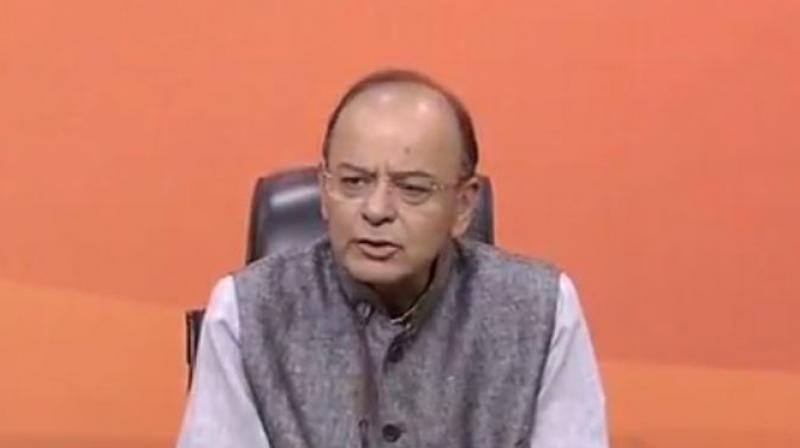Q2 growth marks reversal of declining trend: Arun Jaitley
Indian economy bounced back from a 3 year low to expand by 6.3 pc in July-Sept compared to 5.7 pc in April-June.

New Delhi: Finance Minister Arun Jaitley on Monday said the economic expansion recorded in July-September period marks the reversal of the declining trend of growth witnessed in the last few quarters.
During his pre-budget consultation meeting with the economists here, he said the government is following the road map of fiscal consolidation under which the fiscal deficit stood at 3.9 per cent in 2015-16 and 3.5 per cent in 2016-17 and is budgeted to be 3.2 per cent for 2017-18, said an official release.
Economists made host of suggestions for the forthcoming budget, including increasing social security pension, lower the corporate tax up to 20 per cent by removing exemptions, issuing long term 'New India Bonds' to finance pension and infrastructure, and hiking wages under NREGA.
Jaitley said the growth of second quarter marks the "reversal of the declining trend of growth witnessed in the last few quarters".
Reversing a five-quarter slide in GDP growth, Indian economy bounced back from a three-year low to expand by 6.3 per cent in July-September compared to 5.7 per cent in April- June as manufacturing revved up and businesses adjusted to the new GST regime.
He said the government has been able to achieve fiscal targets due to focus on expenditure rationalisation, plugging of loopholes in public expenditure through Direct Benefit Transfer Scheme and the Public Financial Management System, and by making innovative revenue raising efforts among others.
"The government should continue to follow the path of fiscal consolidation and in case, there is any shortfall due to any reasons in achieving the fiscal targets, the same thereof may be clarified" was another suggestion made in the meeting, said the release.
During the meeting, economists also suggested that tax compliance can be increased by rationalisation of taxes and cost of tax compliance may also be reduced. In order to create more job opportunities, it was suggested to increase manufacturing to GDP ratio to 25 per cent and incentives to SMEs among others, the release said.
Incentivising non-farm services in rural areas for increasing the farmers' income, bringing in more and more subsidies under Direct Benefit Transfer Scheme, more thrust to core Research and Development (R&D), and more outlay for bank recapitalisation were some of the other suggestions.
"Another suggestion was to give more thrust on disinvestment of Public Sector Units (PSUs) as it will provide extra revenue for bridging the fiscal gap and meeting the expenditure needs," the release said.
Participating economists also made a case for raising old age pension from existing Rs 200 to Rs 500 and widow pension from Rs 300 to minimum Rs 500. Speaking to reporters after the meeting, economist Jean Dreze said the amount for social security pension has been Rs 200 per month.
"This is totally unacceptable. There is no reason to keep it so low. So, make it at least Rs 500, I would say even Rs 1,000, if possible and increase the coverage," he said.
Former Chief Economic Adviser Arvind Virmani said the government should carry out customs and exim duty reform as the sector has not seen reforms for 10 years. According to Rathin Roy, member Economic Advisory Council to the Prime Minister, the government is expected to stick to fiscal deficit target.
"I think there is a political commitment (to do this). I reinforced that. I am sure they will. I said that we understand that there is a genuine commitment to maintain the fiscal deficit and revenue deficit targets. Operational constraints may vary but political commitment is there," Roy said.
Besides Jaitley, the meeting was also attended by top finance ministry officials, including Finance Secretary Hasmukh Adhia, Chief Economic Adviser Arvind Subramanian, Expenditure Secretary A N Jha and Financial Services Secretary Rajiv Kumar.
Economists who participated in the meeting, include Sajid Chinoy (Chief India Economist, JP Morgan), T N Ninan (Chairman, Business Standard), Surjit S Bhalla (MD, OXUS Investment), Ajit Ranade (Chief Economist, Aditya Birla Group), Majoj Pant, (Director, IIFT), Shekhar Shah, (Director General, NCAER), (Sunil Jain, Managing Editor, The Financial Express).

